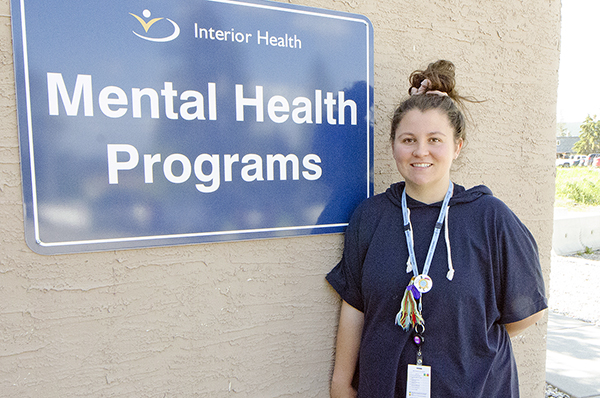Home »

Playing a pivotal role in harm reduction
By Erin Knutson
Shelby Ross, as part of the episodic overdose prevention (eOPS) team, plays a pivotal role in harm reduction, partnering with their peers at Interior Health’s Mental Health and Substance Use unit at Rocky Mountain Lodge in Cranbrook, to combat the devastating effects of the opioid crisis.
Ross (pictured above) is a registered nurse who works with the Cranbrook mental health and substance use team as their episodic overdose prevention nurse.
“All people matter regardless of their reliance on a substance, and all people deserve safe healthcare,” said Ross of the patients she sees daily.
Clients sometimes face stigma as a significant challenge when they access health services in the community.
The Interior Health eOPS team helps clients who may have barriers to accessing health services because of their reliance on substances. This can include monitoring clients after they have used substances, providing clean supplies and education around safer use, and intervening in the event of a drug poisoning. They also bridge clients to other services, such as OAT (opioid agonist therapy) and counseling, always prioritizing the client’s objectives.
OAT, a prescription that qualified nurse prescribers and physicians can administer, offers a remedy for opioid use disorder. It can mitigate withdrawal symptoms and diminish a client’s reliance on unsafe drug sources.
The chances of a person experiencing drug poisoning are high, given the toxic drug supply. Organizations such as Ankors in Cranbrook are essential to helping people stay safer.
“There is a toxic drug supply, and it’s unpredictable. Even if you know your dealer, you can’t always know what you’re buying.”
Interior Health and some of its local community partners (Ankors, East Kootenay Addiction Services Society, Street Angels, among others) offer drug testing kits and clean supplies to help combat rising fatalities and prevent further illness and injury related to the opioid crisis.
The goal is to protect an already saturated healthcare system struggling to keep up with the demand for detox services and patient care for recovery.
“Demand outweighs availability, and often there is only a one to three-day window to get people into treatment. This is a problem across the province of British Columbia.”
Due to limited acute care and outpatient detox and treatment resources, a greater emphasis on community outreach can facilitate a positive connection point for clients to engaged with counselling and other services.
Emphasis on outreach services, helps connect with individuals and meets where they are at in their journey with substance use. It also serves as individual’s point of connection to acute detox and substance use treatment beds, when they are ready.
“We are patient-driven and client-focused, allowing people to connect at any time without expectation. We consider relapse part of the process and welcome people to return anytime.”
Taking offence is not part of their vocabulary when it comes to dealing with clients. Seeing the humanity in individuals first, and not the illness, is a core value of hers and the team she is part of.
Ross and her colleagues with Interior Health’s Substance Use teams, have capacity to be there for those who reach out. One of the best parts of her work is her coworkers, and she credits them as an effective and organic unit supporting one another and their clients.
“We meet people where they are and help move them to where they want to be,” she said of their program at RML MHSU.
Stopping substance use altogether is not always a goal for people, especially if many of their basic needs are unmet. People have a hierarchy of needs for stability and good health, including shelter, food, water, clothing, and love, says the nurse who demonstrates extraordinary compassion and understanding for her clients.
Many of Ross’s clients lack housing, with few options to change that. Many have experienced repeated trauma and find benefit from extended care and rehabilitation as part of their recovery.
“They often have nowhere to go. With minimal proper housing, they are in shelters and tent encampments, and find themselves entrenched in this cycle; some people don’t see a way out,” she said. “Most of them don’t have a home base, they are in perpetual survival mode; but they are some of the most resilient people I’ve ever met.”
Ross and the team at RML MHSU believe that life is sacred and work their best to afford their clients the opportunity to live another day and to have another chance.
Ross’s role, which she loves, is promoting harm reduction and creating a safer place for people to seek help. She credits her coworkers for supporting her to do this work well.
“We are not attached to outcomes; we want to foster resiliency, lessen the impact of the toxic drug supply, and offer hope.”
Supports are available for friends and family, and all services are accessible by anonymous self-referral. Interior Health’s Substance Use services are not only for people with an opioid use disorder, “We want to provide help and support for any person who is experiencing problematic substance use” says Ross.
Ross invites anyone seeking support to contact the Substance Use Team in Cranbrook at 250-420-2210 or call 310-MHSU. For further resources, please visit. www.interiorhealth.ca
Erin Knutson photo
e-KNOW







